Let’s imagine, for the heck of it: an Instagram interaction but like… in real life.
Say, your own sweet, lovely grandma ambling into a plant store.
She’s browsing… idling… taking in the sights. Maybe she’s even a little lost… No brand awareness. No marketing campaign drove her. No brand loyalty. Just your sweet ol’ grandma, curious about the plants inside.
Suddenly, the store owner, clearly jazzed by the sight of a new potential customer, places a cute lil plant on the counter (his best shot at converting) and says to your grandma, “This philodendron is the perfect fit for grandmas.”
He stands back, looking at his plant, proud of what he’s made. (If you’re keeping up, this is the equivalent of posting a photo of a plant on Instagram.)
Intrigued, your grandma steps closer, genuinely impressed. She asks — now, a form of customer engagement — “Oh amazing! Does it need to be watered often?”
The store owner — not familiar with this idea that you need social media customer service — continues to stare proudly at his plant. Clearly, this is a common customer inquiry: Your grandma is worried how fussy the plant will be. Let’s for the sake of argument even call it a Frequently Asked Question.
With one short answer, grandma is ready to become a loyal customer, if she could only get an answer. But the plant man isn’t listening.
“Anybody home?”
Another pause.
“Are you gonna… answer… or?” she asks, now clearly weirded out by this man staring at his plant.
But the store owner remains oblivious. The customer conversation ends there. Grandma slowly backs away and leaves the store slash Instagram page. All she knows now is that she is still interested in cute little plants, so she goes to the store down the street (in this analogy, to another social media account) and places all her unending brand loyalty there.
After a 20-minute pause, the store owner snaps out of his trance. “Oh, you can water it when the topsoil is dry!” he calls out, finally noticing his potential customer has left the building.
“Hello? … Miss lady? Where’d she go?” he mutters to himself.
But no.
That query has gone unheard, unanswered. He lost a sale and is now sad.
We are all sad.
It’s Time to Treat Your Instagram Like Real Life
A lot of creators think answering customers like this isn’t a type of customer service or customer support.
We think of it as just answering another customer issue, collecting feedback, dealing with fires that come up when folks are angry.
Whatever you want to call it, in reality social media customer service isn’t all that much different than real-life customer care: Speed, thoroughness, and politeness are crucial.
The goofy scenario above still highlights a super-important point: like in real life, timely and thoughtful answers to customer concerns are essential for social media customer service, especially when you’re trying to sell something, no matter what social channel you’re on.
By instantly engaging with customers online, you can ensure that that metaphorical grandma doesn’t walk out of your store, but rather leaves with a purchase — and perhaps even lifelong brand loyalty.
So, don’t let your unattended social media presence be a missed opportunity!
Let’s talk about how faster replies can mean more cash, and how to turn every interaction (even the dreaded customer complaint) into a delightful experience for your customers.
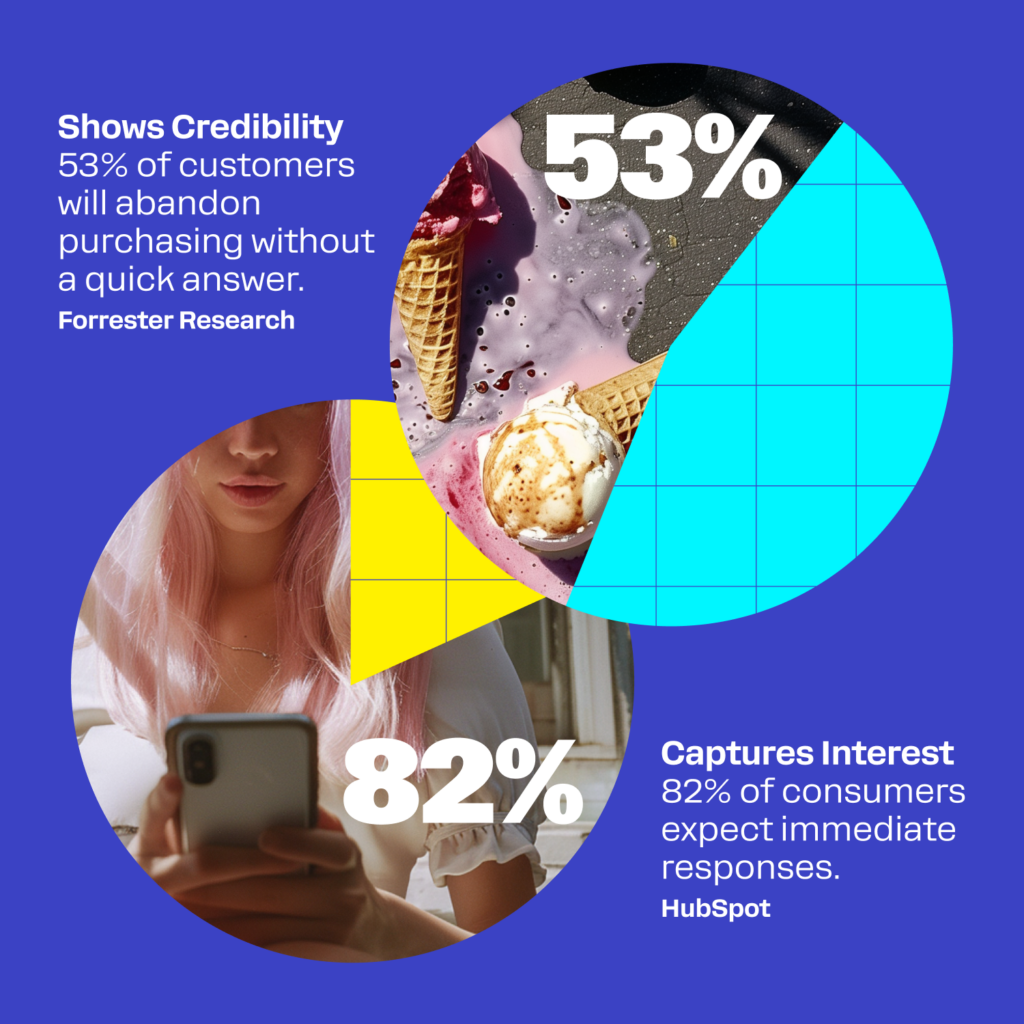
First: The Data-Backed Power of Promptness
Social listening data clearly shows how important it is to respond quickly. In fact… here’s a lesson in the importance of customer communication:
Did you know you’re 100 times more likely to convert a customer if you respond to their direct message within five minutes compared to waiting 30 minutes?
This frankly-bonkers difference shows the critical importance of answering stuff as fast as humanly possible your customer service strategy. Just like in the plant store, a quick reply can mean the difference between getting that sale and losing a potential customer to a more attentive competitor.
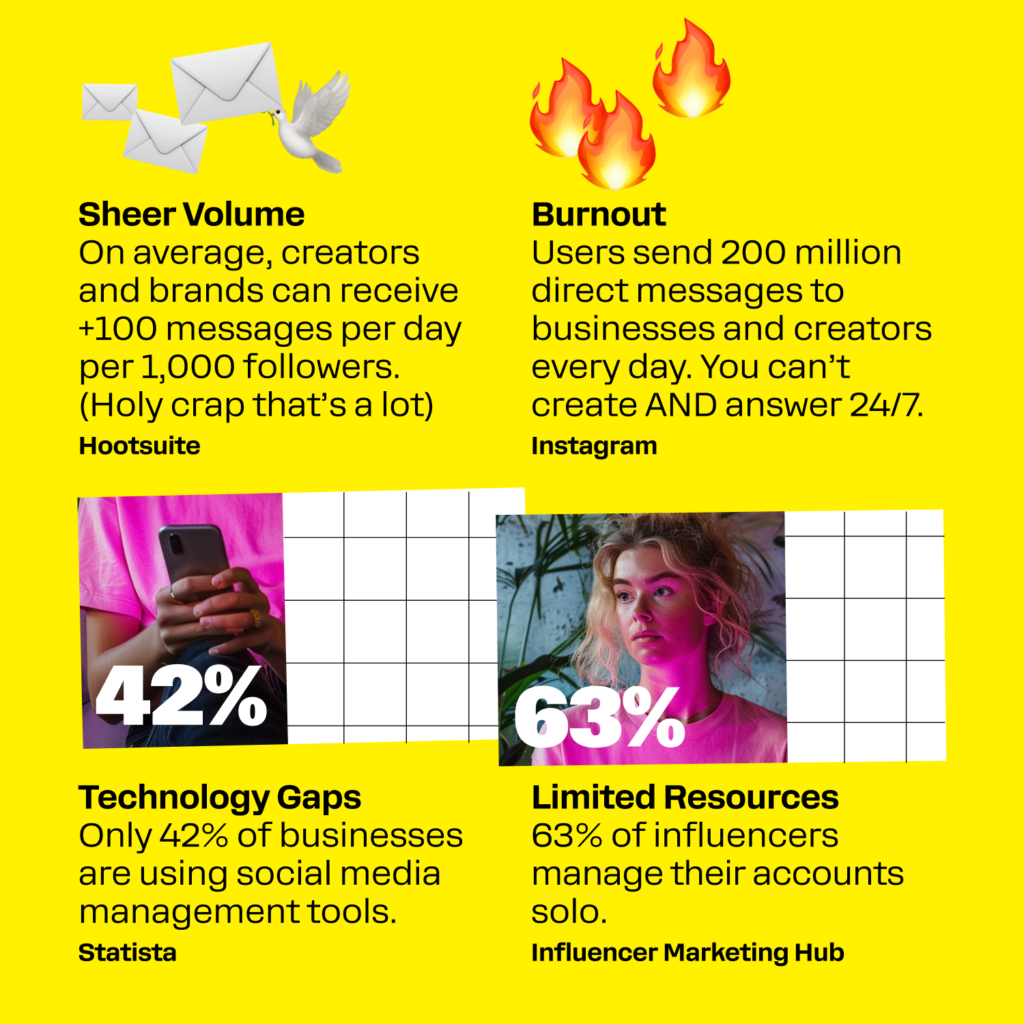
Why Don’t More Creators Answer All Their Questions Immediately?
Despite the absolutely obvious benefits of quick and accurate social customer service, many creators struggle to keep up with their audience’s inquiries. Several factors contribute to this challenge:
Volume of Messages
As creators grow their following, the volume of messages they receive can become overwhelming. Managing a high number of inquiries on one social platform, let alone many, can be impossible without the right tools and processes in place (especially if you don’t have a customer service team at the helm).
Limited Resources
Many creators operate Han Solo style or with super-small teams, limiting their ability to respond to every message promptly. Balancing content creation, marketing, and customer engagement often means that some areas receive less attention. (And granted, usually the last one is less fun, so that’s where the gaps start happening).
Lack of Knowledge
Sad but true: Not all creators are familiar with the best practices for social media marketing and/or engagement. Without an understanding of how important quick responses are, they may not prioritize this aspect of their business. Good news that you’re here reading this article, though. 
Technology Gaps
Some creators may not be aware of or have access to the tools that can help automate and streamline their communication. Using the right tech can significantly enhance your ability to manage your social media customer care more efficiently. Statista reports that only 42% of businesses are utilizing social media management tools.
Burnout
Constantly being “on” and available means burnout. For real. Creators have to balance their personal well-being with their business demands, and sometimes this means not responding immediately to every message. (And there’s seriously nothing worse for your mental health than answering the same five questions over and over again, being real.)
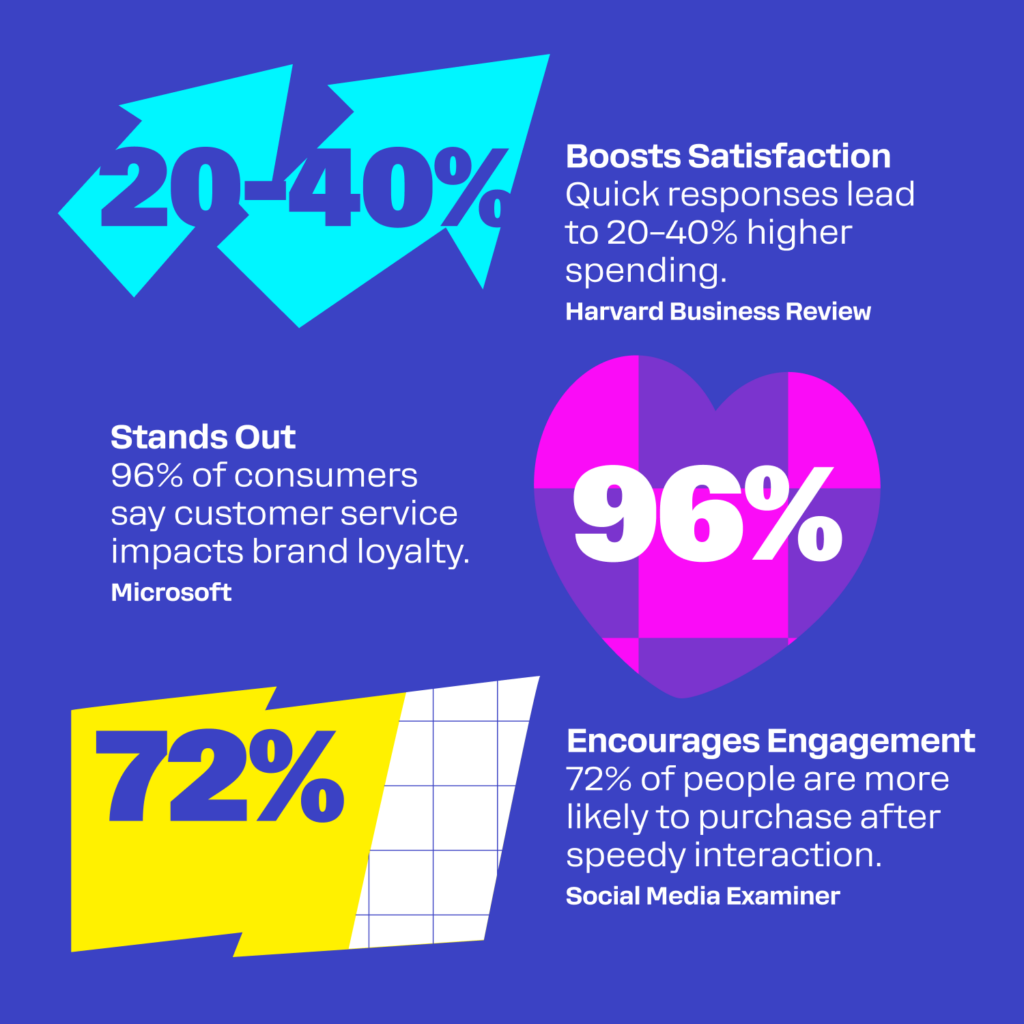
Practical Solutions for Faster Responses: Manual, Team, and Automation
Alright, let’s dive into the nitty-gritty of how you can up your response game on Instagram. We’ll explore three main approaches: keeping a manual spreadsheet, outsourcing the work to a team, and then using automation tools.
Each has its perks and pitfalls, so let’s break it down.
Option 1: Run a Manual Spreadsheet
AKA The Old-School Approach. This method involves tracking all inquiries and responses in a spreadsheet. Think of it as your command center, where you log every kind of common question, categorize it, and note down your response.
Why Use This:
Manual spreadsheets are best suited for those who are just starting out (under around 3,000 followers) or prefer a very hands-on approach. If you have a manageable number of inquiries and enjoy the personal touch of writing each response, this could be your go-to.
How to Do It:
- Open a Google Sheet or Excel Document
- Write in the Columns: Date, customer name, question, response, and status (e.g., pending, resolved).
- Fill It Out As Needed: That simple
Tips:
- Template Magic: Create and save responses for common questions to speed up the process. For instance, if you frequently get asked about shipping times, have a pre-written response ready to go.
- Routine Checks: Set specific times during your day to check and update your spreadsheet. Consistency is key.
- Prioritize Inquiries: Not all messages are created equal. Learn to prioritize urgent queries or those from potential big spenders.
Pros:
- Control: You have a complete control overview of everything that goes out.
- Customization: When you have the time, you can make your responses manually to each customer.
- Cost: Essentially free.
Cons:
- Time: Manually logging and responding takes a humongous amount of time.
- Errors: Easy to miss or misplace entries, leading to frustration (both yours and the follower).
- Scalability: Not feasible as your follower count grows.
Option 2: Hire a Team
AKA The Human Touch! When the volume of customer inquiries becomes absolutely unmanageable, hiring a team might be the way to go. This could be a dedicated social media manager or a customer service team.
Why Use This:
If your brand is growing rapidly and you’re inundated with inquiries, hiring a team can bring much-needed relief. This approach is ideal for medium to large businesses where maintaining a personal touch and fast response times are crucial.
How to Do It:
- Find your freelancers: Tap your network, look for Digital Assistants.
- Define Roles: Clearly outline who is responsible for what.
- Training: Ensure your team understands your brand voice and FAQ responses.
- Tools: Use team management tools like Trello or Asana to keep track of inquiries and responses.
Tips:
- Training Programs: Develop a thorough training program to ensure your new virtual assistant or team understands your brand, your voice, and your values.
- Use Tools: Implement team collaboration tools like Slack for communication and Trello for task management.
- Regular Feedback: Have regular check-ins and feedback sessions to ensure quality and consistency in their responses.
Pros:
- Efficiency: More hands mean faster responses.
- Professionalism: A dedicated team can definitely provide a more polished customer experience.
- Coverage: You can manage inquiries across multiple time zones.
Cons:
- Cost: Hiring even part-time help can be exceptionally expensive.
- Coordination: Requires effective team management and communication.
- Consistency: Ensuring a consistent brand voice can be challenging, especially if you hire virtual assistants in areas who are not native speakers.
Option 3: Use Instagram’s Out-of-the-Box Solution
Instagram offers its own built-in FAQ solution for business accounts, which provides a straightforward way to manage common inquiries directly within the platform. This tool is designed to help businesses respond to frequently asked questions quickly and efficiently.
Why Use It:
Instagram’s built-in FAQ tool is ideal for small businesses or creators who prefer an integrated solution without needing to rely on external applications. It’s particularly useful for those who want a simple, no-fuss way to provide immediate answers to common questions right where the interactions are happening.
How to Do It:
- Set Up FAQ:
- Go to your business profile.
- Tap the menu icon and select “Settings.”
- Navigate to “Business” and then “FAQs.”
- Add your most frequently asked questions along with the corresponding answers.
- Customize Responses:
- You can write responses that reflect your brand voice and provide detailed information to your followers.
- Activate FAQ:
- Once set up, these FAQs will appear as quick reply options for anyone messaging your account, making it easy for customers to get instant answers.
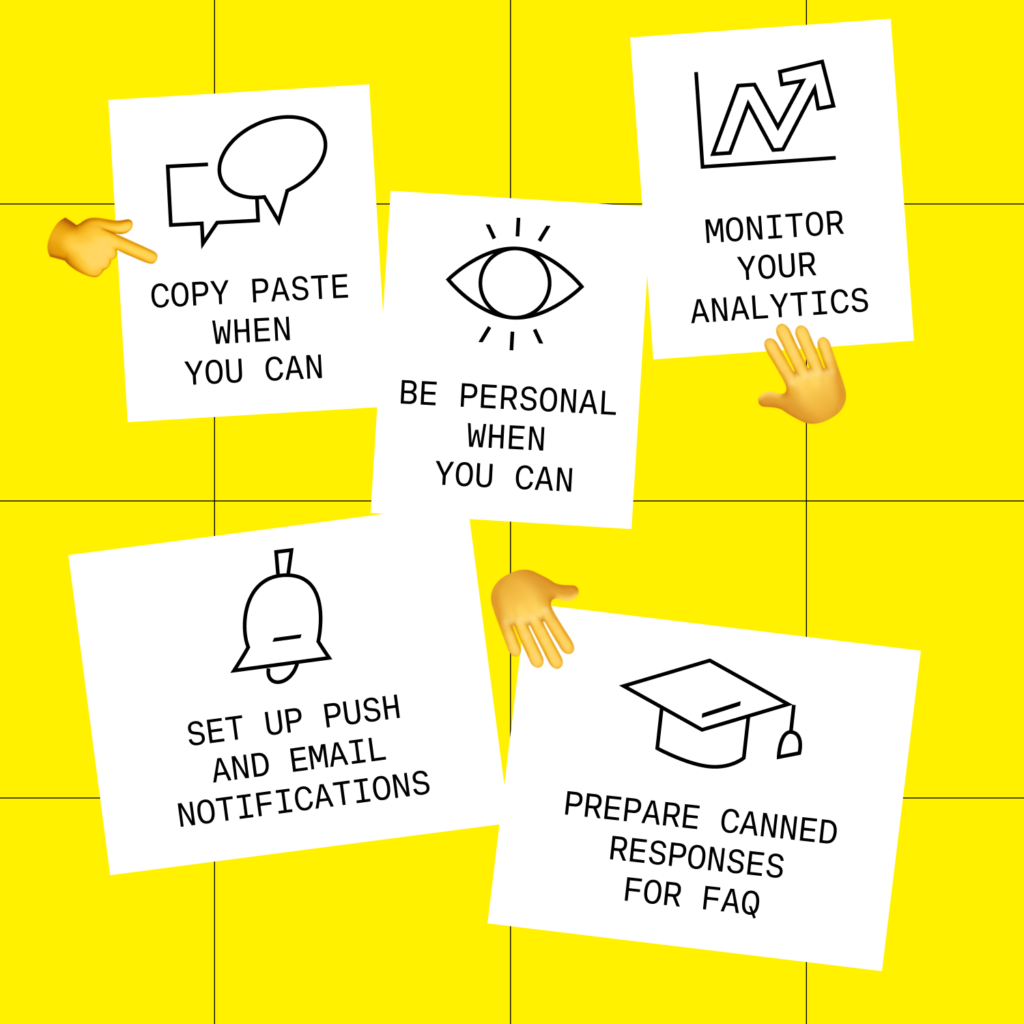
Tips:
- Keep It Updated: Regularly review and update your FAQs to ensure the information is current and relevant.
- Use Clear Language: Make sure your answers are clear and concise to avoid any confusion.
- Monitor Performance: Pay attention to which FAQs are being used the most and consider expanding on those topics in your content.
Pros:
- Integration: Integrates within the Instagram app, keeping everything in one place.
- Simplicity: Easy to set up without needing additional tools.
- User Experience: Enhances the customer experience by providing quick answers.
Cons:
- Limited Customization: Offers less flexibility compared to more advanced automation tools.
- Scalability: Isn’t often sufficient for accounts with high message volumes or complex customer needs.
- Analytics: Lacks in-depth analytics and insights that can be crucial for optimizing customer interactions.
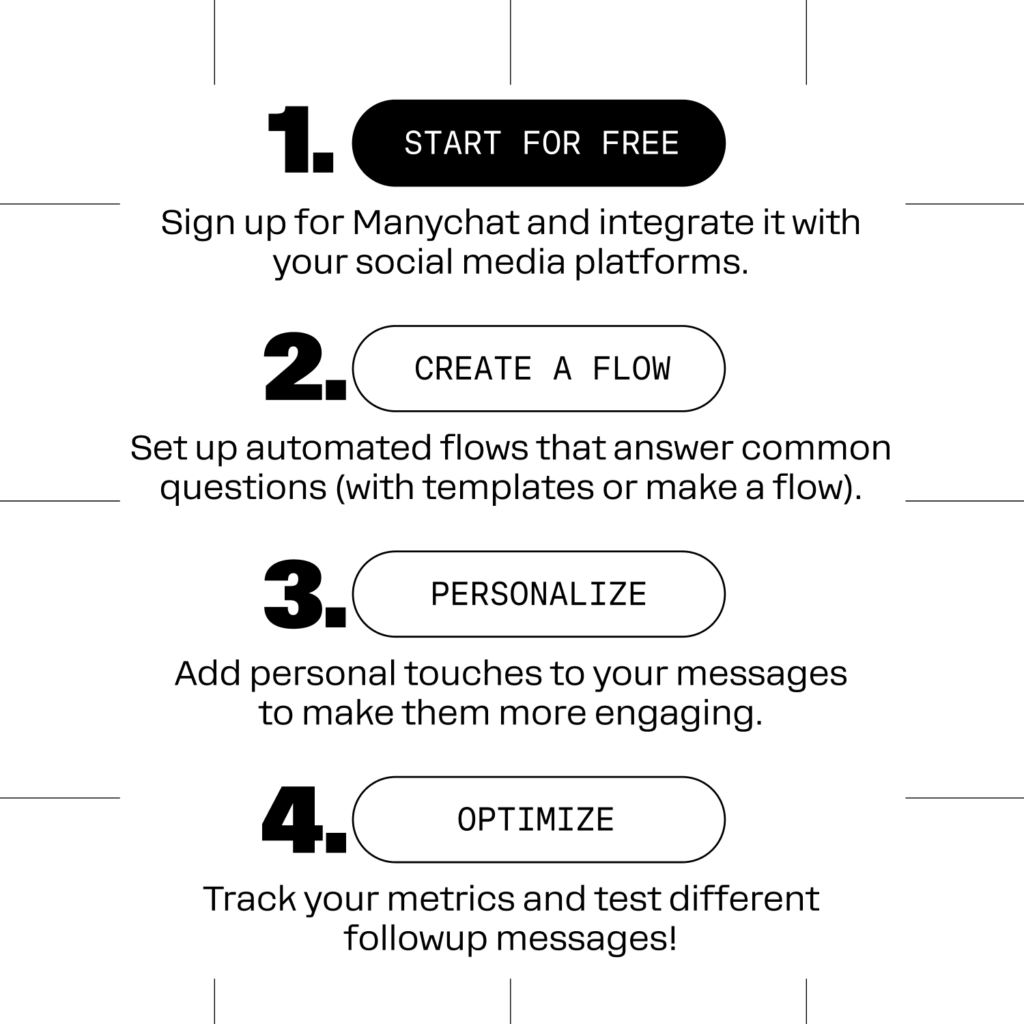
Option 4: Use Automation (Like Us, Manychat)
AKA The Modern Way. Automation tools like Manychat can totally improve how you handle Instagram inquiries. Manychat allows you to set up automated responses for common questions and manage interactions from a single dashboard.
Why Use It:
Manychat is perfect for those who want to leverage technology to handle a high volume of inquiries efficiently. It’s especially useful for businesses that operate on multiple social media platforms and/or need to maintain a 24/7 presence. If you’re considering that your content may go viral (and who knows when that’s gonna be, right?) Manychat is your best bet.
How to Do It:
- Sign Up and Integrate: Connect Manychat with your Instagram account.
- Create Flows: Develop a few automated messaging flows for common inquiries.
- Personalize: Add personal touches to automated messages, such as using customer names.
- Set: And forget.
Tips
- Strategic Flows: Map out potential customer journeys to make sure you know what answers you’re sending to what questions.
- Personalization: Use customer names and reference their previous interactions to keep things human and personable.
- Regular Updates: Continuously update your automated responses based on new FAQs and customer feedback.
Pros:
- Speed: Instant responses to common questions, 24/7.
- Scalability: Can handle thousands of inquiries without breaking a sweat.
- Insights: Access to instant analytics and insights to refine your approach like a badass.
Cons:
- Five Minutes: Takes time to create effective automation flows.
- It’s Not 100% Free: Wow. I know, right? Subscription fees apply for advanced features. And now that I’ve earned my paycheck for the week:
Pros and Cons
| Method | Pros | Cons |
| Manual Spreadsheet | Complete control, customizable, cost-effective | Time-consuming, error-prone, not scalable |
| Hiring a VA/ Team of VAs | Efficient, professional, broad coverage | Expensive, requires coordination, consistency issues |
| Using Manychat | Fast, scalable, insightful, amazing | Initial setup time, after a certain usage it isn’t free (but is free to try) |
Comparing Instagram’s In-App Solution vs. Manychat
Instagram Out-of-the-Box:
- Ease of Use: Integrated within Instagram, simple setup.
- Customization: Basic FAQ setup with limited customization.
- Analytics: Minimal analytics, mostly about usage.
- Scalability: Best for smaller accounts; may struggle with high volumes.
- Cost: Free to use, no additional costs.
Manychat:
- Ease of Use: Requires initial setup, but offers way more automation options.
- Customization: More customizable with advanced features like personalized messages, multimedia support, and detailed customer journeys.
- Analytics: Provides comprehensive insights into message interactions, click-through rates, and customer behavior.
- Scalability: Can handle large volumes of inquiries across multiple platforms.
- Cost: Free tier available, with subscription fees for advanced features.
Making the Final Decision
We just want to help ya make an informed decision based on your specific needs and resources. Whether you’re a creator just starting out or managing a large, established business, choosing the right tool will help you provide timely, effective customer service that can turn inquiries into loyal customers!
Ultimately, your choice depends on your current scale, resources, and personal preference for handling customer interactions. You might find that a hybrid approach, combining elements from all three methods, gives you the best results. For example, use Manychat to handle FAQs, a team for more complex inquiries, and a manual spreadsheet for tracking and personal follow-ups.
If you’re a creator and you’re looking to make money on the Internet, there’s absolutely no alternative to offering timely and accurate responses to your followers and/or potential customers.
It’s a fact of life: Your potential customers are going to have questions. And if you’re there, ready and waiting — either with automation or without — you’re going to see benefits.
Quick answers to Frequently Asked Questions are crucial for building trust, capturing interest, enhancing customer experience, and standing out from competitors. Manychat isn’t the only way to do this, but Manychat is the only tool specifically made to help creators and businesses automate and personalize their interactions, ensuring no message goes unanswered and every opportunity is maximized.
You don’t have to use us to know how important we are, either.
Just ask your grandma.
The contents of this blog were independently prepared and are for informational purposes only. The opinions expressed are those of the author and do not necessarily reflect the views of ManyChat or any other party. Individual results may vary.
